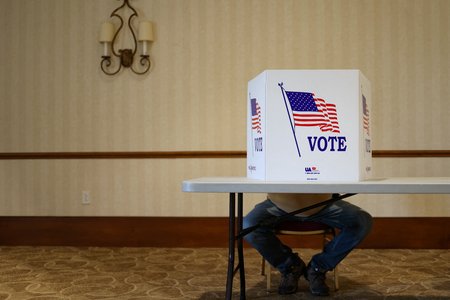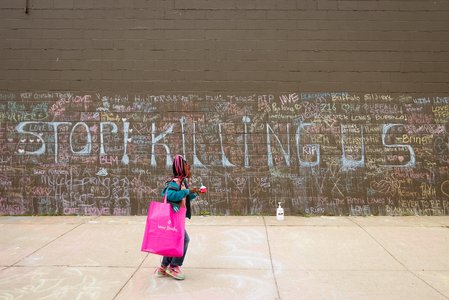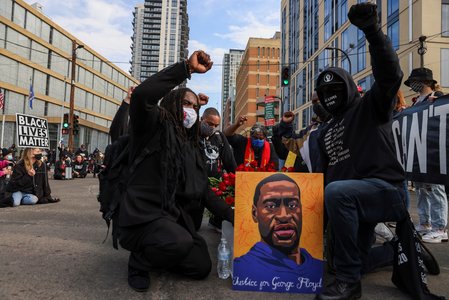In Buffalo, an alleged gunman driven by white supremacist ideology murdered 10 people and injured three more at a supermarket. Most of the victims were Black, making it one of the deadliest racist massacres in recent American history. President Biden traveled to Buffalo to grieve with the community as the House passed a bill to tackle domestic terrorism that has yet to gain Senate approval.
Clip: Grief and anger in Buffalo as the nation mourns another mass shooting
May. 20, 2022 AT 5:22 p.m. EDT
TRANSCRIPT
Notice: Transcripts are machine and human generated and lightly edited for accuracy. They may contain errors.
Alcindor : In Buffalo, New York, an alleged gunman driven by white supremacist ideology opened fire at a supermarket. He killed 10 people and injured three more. Almost all of his victims were Black, targeted because of their race. It was one of the deadliest racist massacres in recent American history. The city and the country are mourning.
Here is Garnell Whitfield. His mother, Ruth, was killed in the shooting.
Garnell Whitfield, Mother Killed in Shooting : And you expect us to keep doing this over and over and over again, over again, forgive and forget, while the people we elect and trust in offices around this country do their best not to protect us. Not to consider us equal. Not to love us back.
Alcindor : So moving.
On Tuesday, President Biden traveled to Buffalo to grieve with the community.
Biden : Jill and I bring you this message from deep in our nation's soul. In America, evil will not win, I promise you. Hate will not prevail, and white supremacy will not have the last word.
Alcindor : Well, the president acknowledged his limitations, saying there is little executive action left to pursue on guns.
Meanwhile, the House passed a bill to tackle domestic terrorism. But the bill's future in the Senate is unclear.
Joining me tonight to discuss this and more, Toluse Olorunnipa. He is a political enterprise and investigations reporter for "The Washington Post." Robert Samuels, national political enterprise reporter for "The Washington Post". Together, Robert and Toluse are the co-authors of a new incredible book, "His Name is George Floyd: One Man's Life in the Struggle for Racial Justice". And joining us also, Kelsey Snell, congressional correspondent for NPR.
Thank you all of you for being here.
I want to start with you, Robert. You have, of course, reported across this country so many now are traumatized by this recent shooting in Buffalo. The alleged gunman wrote something like an -- 180-page racist rant, some are calling it a manifesto, saying that he was going to target Black people. He also live streamed this shooting.
Given your reporting, what you did for the book, but also, of course, what you've been doing at "The Washington Post", how did this really connect to the sort of issues that we've been facing when it comes to racism in this country for so many years?
Robert Samuels, The Washington Post : Well, when we see what happened in Buffalo, we see again the pernicious and insidious force of racism in this country and how it operates.
Now, what we know about the shooter is that he was concerned about being replaced as a white man. Where does that come from? Well, it comes from this fear that if people of color start to become the majority in this country, that something could go wrong. It comes from a lack of understanding and a lack of empathy for people in this country who are trying.
And that is what's truly fearful, that's what's truly upsetting about it and when you hear the mourning of a person who's been victimized, of the family who is looking at one less seat at the table, saying what more can be done? We're tired of this happening. That is the cry that's happening with many people of color across the country as we try to figure out how it is possible to stamp out white supremacy.
Alcindor : And Toluse, what Robert was just talking about is really this racist conspiracy theory is called the replacement theory, and it's essentially a false claim that there is this movement afoot attempting to replace white people with non-white people through interracial marriage or through immigration.
What's the significance of the fact that this shooter is talking about replacement theory in the political atmosphere that we're living in, given the fact that there are some critics who say conservatives have lean need this conspiracy theory?
Toluse Olorunnipa, The Washington Post : Yeah. This conspiracy theory has been around for quite a while but we've seen it really gain steam, especially over the last two years. We've seen it gain steam in the aftermath of the George Floyd protest and one of the things we cover in our book, Robert and I, is what happened immediately after George Floyd died, which there was this great coming together across the political spectrum of people essentially saying that that was wrong and that we need to stamp out white supremacy, we need to stamp out racism, we need to stamp out institutional racism and -- in the police forces but we saw the backlash.
And that is something that we are seeing in our politics. We're seeing how people who campaigned on issues like banning critical race theory were able to control their political fortunes and find themselves in power as a result of focusing on those issues, focusing on the backlash and focusing on the grievances that are out there. And we've seen people try to cash in on that.
And the outcome of that is somebody who's disturbed, somebody who finds that community online, somebody who has hate in their heart is able to pick up a gun and go kill real people in a real-life incident that was a tragedy. And, you know, politicians and people in the media that are flaming these tensions and essentially trying to either ride them into power or ride them into wealth, they have to live with the fact that real people are hurting as a result of what a real person did and how real people are no longer alive as a result of it.
So, it's not just a theory. It's not just something that people can talk about as a political strategy. This is something that can be very dangerous and that is something that I think the Biden administration and folks in power are now grappling with. This isn't something that we can ignore anymore. It's become a real force.
Alcindor : And it is real consequences that lawmakers are trying to grapple with, Kelsey, as you -- as we think about sort of the movement and non-movement in Congress. You said that there really isn't a lot being done right now when it comes to hate crime legislation or gun reform.
But I still want to ask you, what plan do Democrats in particular since they are the ones really talk about passing issues and legislation on these issues, what plan do Democrats have in place or what strategies are they talking about not only to get things passed but also to get on the same page? Because the party isn't on the same page.
Kelsey Snell, Congressional Correspondent, NPR : right. The lack of a plan is the theme of this week. And I thought it was very interesting that we saw the House move and -- this anti-terrorism bill because it is in some ways the thing that they feel they can do because like you said, there isn't unanimity among Democrats about how to address gun control in particular.
You know, we hear particularly from Senator Joe Manchin from West Virginia and I feel like we say this all the time when we talk about the dynamics of Congress right now but he is opposed to many of the measures that other Democrats support. He does not support many of the background check and large magazine bans that a lot of other Democrats do support. He's returning to this Manchin-Toomey bill that he worked out with Republican Senator Pat Toomey that is fairly narrow but actually really didn't get very far in the Senate.
It is another moment where Democrats are responding to a base of voters who are calling for action, who are calling for swift action and are having to respond that they simply do not have the votes within their caucus in Congress to respond to the demands of their own party.
Alcindor : And, Kelsey, sticking with you, you said the idea of the lack of a plan being the theme here, what are lawmakers saying about the role that President Biden and the White House can play in sort of reacting to what we saw this week and what we saw over the last few years?
Snell : Yeah. This is another situation where they talk about the president as a uniter in chief and as -- his role being to speak to the country. But there are very clear limits on what can be done through executive action. We heard the president himself talk about that.
So there -- this is a situation where Congress would have to be the place where action happens, and that is not the place where action is happening.
Alcindor : And Toluse, I want to come to you.
President Biden, he referred to the Buffalo massacre as terrorism on Tuesday. And he also -- you had other prominent figures sort of mimicking that language and echoing that language. But there is no federal statute here. So you've talked to President Biden all -- about racism particularly for the book. I wonder what your takeaways are on the way that the president is speaking about this but also overall his vision of what to do next?
Samuels : Yeah. There are a couple of things that Biden could have done when he went up to Buffalo to console the family members and to talk about solutions. He could have spent time talking about gun control and that was part of the speech. But one that you really wanted to do was talk about this very issue that allowed -- that caused him to get into the presidential race in 2020.
And he told Robert and I about that, about how he thought he had hung up his political hat for the last time when he left the White House. But then he saw people marching in Charlottesville and decided that he had to get back into the race. He had to do something to heal the soul of the nation.
And that's what we heard in his speech. That's what we heard when we spoke to him and even months ago back at the end of last year. He said a similar message to what he said in Buffalo which is that hate doesn't go away in this country. This original sin of hatred in this country continues to be part of our fabric and continues to be something that we grapple with.
But he wants the better angels of our nature to win out and that is his message that this ongoing struggle between light and darkness, between love and hatred, continues. But we have to continue to fight and make sure that hate doesn't win in the end. That white supremacy doesn't win in the end.
And it was a powerful and moving speech, Biden tends to be at his best when he's consoling and talking about these issues that he actually feels. He feels deeply, issues that he has talked about for quite a long time and is part of his political record.
So I do think that it's something that he's going to take into the midterms and going to take this message pretty deep into the rest of the year because he feels that -- it powerfully and something that he can talk about eloquently.
But at the same time, you know, eloquence, talking and speeches are one thing. And policy, like Kelsey said, the -- a very different thing and there does not seem to be much policy making whether it's on guns, whether it's on racism, whether it's on institutional issues that need to be addressed, and that is what makes it difficult.
These powerful speeches and consolations from Biden can get you so far. But a lot of people are looking for solutions and it's hard in a 50-50 Senate where Democrats aren't always united on exactly what needs to be done and you need 100 percent unity, it's hard to get things done and that's one of the areas where it’s going to be difficult for that message to get across because people want to know exactly what has been done and what’s going to be done and it's hard to deliver on that in the current political environment in which we live.
Alcindor : Hard to deliver. Kelsey, I want to come back to you. We should also mention that there was a shooting in Laguna Woods, California, authorities say that the man there shot up a church of Taiwanese American church targeting those people because they -- of his hatred for Taiwanese people.
When you have these things happening together, again, I know that we've had the theme where there is no plan but I just wonder when you have these things happening, does the conversation change among lawmakers? Are you seeing sort of any sort of wiggle room here?
Snell : Well, you know, I think we hear from a lot of same lawmakers who are as frustrated as their own voters. Democrats who really do feel that this needs to be addressed.
You know, I’m hearing from lawmakers who say they've introduced bills over and over on hate crimes, who feel that they are trying to push the party forward and are not having success. You know, I think it's really interesting Toluse mentioned about bringing this into the midterms.
And we keep hearing that from Democrats. We keep hearing that they're going to use the condition of the country and the things that we're watching play out every day as a way to convince voters that what needs to happen is that more Democrats need to be elected. That they need to have larger majorities in the house and the Senate in order to actually pass the things that they promised the last election and the election before that.
And it's really a difficult sell for people who have been waiting for Democrats to deliver regardless of the reality of math, people look for results. They want to see something come of their vote and it's very difficult for Democrats to be in that moment right now where they are not able to point to a lot of successes where they followed through on the promises that they made. You know, because of the dynamics of the Congress.
Alcindor : That's a tough dynamic there. Robert, I want to come to you before we start talking about the midterms because obviously this is the week that -- the book that we're going to talk about in the extra but two years since George Floyd was murdered, we can say now, because there was an officer who was convicted of murdering him.
When you look at the last two years, what did your report, how does your reporting connect to sort of where we find ourselves today as a country? Again, we'll get to the midterms but just a couple of seconds before we turn to that subject.
Samuels : Well, I think about the conversations that I had with Reverend Al Sharpton and Jesse Jackson. And Reverend Sharpton told me there's Newton law to the civil rights, that for every action there is an equal reaction. And sometimes it's a deadly reaction.
It's hard to believe that two years ago, the books that everyone thought we should be reading to understand systemic racism are the same books that are trying to be banned in 2022. It's hard to believe that when you saw momentum on the state and local levels about banning no knock warrants and banning chokeholds that there still hasn't been anything done on the federal level.
So the question that we have to posit, I think, if we are serious about confronting the idea of racism and making lives better for not just the family of George Floyd but those who are lost in Buffalo and those who live with the systemic impact of racist policies in the United States, if we cannot do that, what can we do? What can we hope for?
And I think that's one of the questions that people continually ask how can we continue to be hopeful when we see all of this happening?
Now, a lot of people believe that the long arc bends toward justice. And that gives people hope and sometimes it's unfortunate that that American hope can feel more like a defense mechanism than an actual product of what we're seeing in America.
Alcindor : Yeah. Those are all key issues that are also on people's minds as they're going to the polls.
!FROM THIS EPISODE


Clip: Primary elections in battleground states spotlight Trump’s hold on the GOP


Full Episode: Washington Week full episode, May 20, 2022


Special: New biography captures George Floyd's life before he died at the hands of police

© 1996 - 2026 WETA. All Rights Reserved.
PBS is a 501(c)(3) not-for-profit organization
